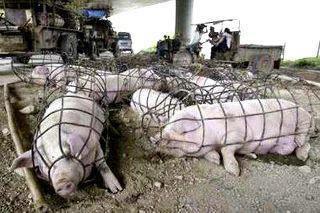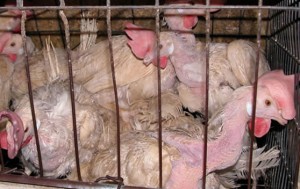
12 Apr EARTH MATTERS: (AG) GAG ME!

This is about “Babe.” Ag-Gag laws hide this abuse
Piglets flung into the air. Calves repeatedly given electric shocks. Dead chickens left to rot in cages next to living ones. Abuses like this should certainly concern lawmakers, both because these practices are inhumane and because they can cause serious animal and human health problems.
And many state legislatures are, in fact, taking action. It’s just that the actions they are taking seek to hide the abuses, rather than expose and stop them.
Several states, including California, Illinois, Arkansas, Wyoming, and Indiana, are considering so-called “Ag-Gag” laws that would make illegal not the farm abuses themselves, but videotaping or photographing the farm abuses. (For more on this issue, see the recent New York Times editorial here and an Atlantic Monthly article written by a former Humane Society of the US investigator here.)
These legislative proposals are spreading thanks in part to ALEC (the American Legislative Exchange Council), the organization that has authored legislation to privatize education, disenfranchise voters, and protect pharmaceutical companies. ALEC actively supports industry-friendly initiatives, often regardless (or in spite) of the effects on consumers or citizens. (See alecexposed.org for more on the kinds of bills ALEC is trying to pass.)
The meat industry – especially large producers – claims that they can “police themselves” (see, for example, a blog series by Emily Meredith, the communications director for the Animal Agriculture Alliance here).
Meredith writes:
“What’s an even bigger failure are the undercover activists that encourage—or even participate in — abuse. Further, there are incidences where activists find no abuse at a given operation, but take footage of graphic—albeit standard—industry practices and air that footage with no explanation, or worse—a misleading one.”
She continues:
“These bills aren’t about “silencing” the activists as they claim, but rather requiring them to do the right thing and report their allegations to the proper authorities. The industry has nothing to hide, and these bills force the industry to address any issues that arise head on and right away—something that every operation that was the subject of an undercover video lost the opportunity to do when they were not informed of any animal welfare problems.”
This industry response is counterproductive, though. Attacking those who are trying to bring abuses to light is the wrong approach. We need more transparency about how are food is produced, not less. And not all meat producers are supportive of ag-gag laws, understanding that by being open, they will reassure consumers that their product is being produced in a safe, humane way. (See, for example, a post on the issue by Miolea Organic Farm here.)

Chicken Little. The sky is falling.
Instead of attacking those seeking to expose the problems with our industrial farm system as just a few crazy vegan activists, lawmakers should realize that all citizens should have a chance to know what they are eating and how their food is produced. That would help everyone – animals, consumers, and, in the end, the meat industry itself, by improving the quality of their product and gaining the trust of the people who eat it.
For more information on ag-gag laws and groups fighting them, go here.


Sorry, the comment form is closed at this time.